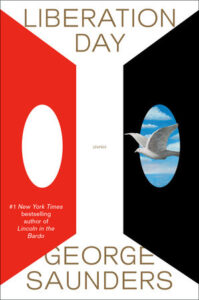
George Saunders on Reading Chaotically and the Power of Generous Teachers
The Author of Liberation Day Takes the Lit Hub Questionnaire
George Saunders is the author of nine books, including the novel Lincoln in the Bardo, which won the Man Booker Prize, and the story collections Pastoralia and Tenth of December, which was a finalist for the National Book Award. He teaches in the creative writing program at Syracuse University. His new story collection, Liberation Day, is available from Random House.
*
Literary Hub: How do you decide what to read next?
George Saunders: I’m not a systematic reader at all. I just leave books piled up all over the place (in my writing room, and by my bed), then read whatever calls out to me. A few weeks ago I bought a bunch of “Collected Stories of ***” (Collected Stories by Gabriel Garcia Marquez; The Elephant Vanishes, by Haruki Murakami; Going to Meet the Man, by James Baldwin, The Complete Stories by Zora Neale Hurston; Insurrections, by Rion Amilcar Scott; White Cat, Black Dog, by Kelly Link; The Collected Stories of Eudora Welty) and have been trying to keep to a discipline of reading two stories a day.
LH: Who is the person, or what is the place or practice that had the most significant impact on your writing education?
GS: Well, I remember how generous my teachers at Syracuse were, back in those early (vulnerable) days. My teachers there were Tobias Wolff and Douglas Unger. I studied them, to figure out work habits and ethos and all of that, but also learned about the value, to a teacher, of being open and honest about the difficulties of the craft. Also, they were both such decent, funny people, and that relieved me of the burden of thinking a writer had to be dark, brooding, dysfunctional, and all of that. The main thing those two teachers were, was generous.
LH: What’s a book you recommend to other writers?
GS: Especially to short story writers, I find myself recommending Isaac Babel’s Red Cavalry, as a model for the ways in which a short story collection can be innovative in its arrangement—in the type and order of the pieces included and in the variation of voices within it. It’s such a radical, uncompromising book, so wonderfully crazy.
LH: What is your favorite way to procrastinate when you are meant to be writing?
GS: I have guitars in my writing room. But I don’t think of it as “procrastinating” but as, you know, “getting ready.” There’s something about goofing around on the guitar for a few minutes that has the effect of priming the pump, sort of. It feels like it reminds the creative mind to try to stay light and free and fun and not take itself too seriously.
LH: If you weren’t a writer, what would you do instead?
GS: See above. I’d love to be a lead guitar player or maybe, if I could go back in time and get better trained, a composer of serious music. When I listen to works by artists like Missy Mazzoli or Caroline Shaw or John Adams, I feel a similar pattern of neuron-firing as when I’m thinking about writing something—that hunger to make structure and form part of the meaning of the piece, the desire to find a way to make something that would resist being explained.
__________________________________

Liberation Day by George Saunders is available now via Random House.



















